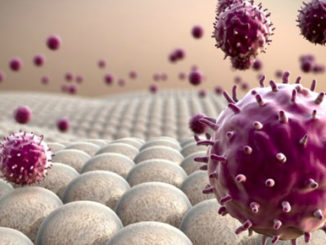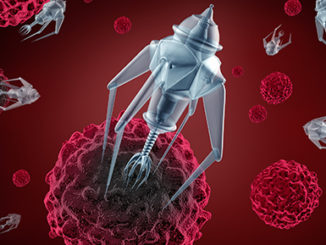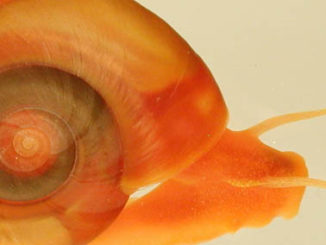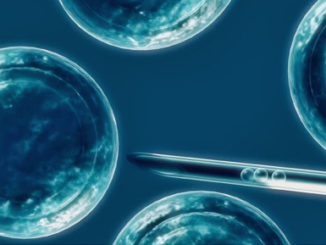Articles that explore the connection between epigenetics and diseases and disorders, including cancer, cardiovascular disease, diabetes, autoimmune disease, and more.
As the weather gets cooler and winter begins to set in, we’re reminded that the immune system is our first line of defense against foreign pathogens and helps prevent us from getting sick. The immune system is comprised of different types of cells that are able to recognize and destroy disease-causing microbes, such as bacteria, viruses and parasites. This advanced system has aided humans in fighting off intruders for thousands of years – and good thing, because no one likes [more…]
Epigenetic drugs designed to fight cancer might actually be used against many viruses as well. A recent study published in the American Society for Microbiology shows that some pharmaceuticals that act epigenetically have the power to be used as broad spectrum antivirals. Specifically, the researchers looked at histone methyltransferases EZH2/1 inhibitors which can help fight against cancer. Numerous DNA viruses, such as herpes simplex virus (HSV), are involved in epigenetic regulation which determines productive infection, persistence, and latency. Modulation to [more…]
You can now add “harmful changes to your DNA” to the long list of reasons to quit smoking cigarettes, along with lung cancer, coronary heart disease, increased risk of death, stroke, chronic lung disease, decreased immune function, infertility, and the fact that smoking harms nearly every organ in the body. Researchers at the Johns Hopkins Kimmel Cancer Center recently contributed to the growing evidence that demonstrates that smoking cigarettes – which contain a deadly cocktail of over 7,000 chemicals – [more…]
Heart disease has been singled out as the leading cause of death among people with diabetes. It’s estimated that 68 percent of diabetics age 65 or older will die from some form of cardiovascular disease. Coronary atherosclerosis, or hardening of the arteries, is the most prevalent of these diseases, but there is another very common heart condition specific to diabetes that has been getting more attention in recent years. It’s called diabetic cardiomyopathy (DCM) and it’s independent of coronary artery [more…]
Exposure to environmental pollution, such as diesel exhaust or concentrated urban air particles, during pregnancy could increase a child’s risk of developing asthma via epigenetic mechanisms. Recent research in the Journal of Physiology – Lung Cellular and Molecular Physiology suggests that this allergic susceptibility might even be epigenetically passed down for several generations. Asthma forms as a result of the complex interaction between someone’s genes, epigenetic marks, and the environment. Epigenetics, the study of how chemical tags impact the expression [more…]
A certain type of mushroom might epigenetically prevent tumor growth, according to a study published in the Journal of Cancer Research and Treatment. A medicinal mushroom, Phellinus linteus (PL), could come with “magical” anticancer properties. Researchers from New York Medical College found that histone deacetylase (HDAC) inactivation and histone acetylation led to the death of bladder cancer cells. Chemotherapy and immunotherapy often come with severe side effects, and for those suffering from bladder cancer, the use of these therapies is [more…]
A small freshwater parasite burrows into the bare skin of an unsuspecting swimmer and enters their bloodstream. Once inside the blood, it grows into an adult worm, quietly feasting on its victim’s nutrients and breeding for some time, until one day its destruction becomes serious and life-threatening. While this could be the storyline of a bad horror film, it’s tragically the real tale of schistosomiasis – a deadly neglected tropical disease that kills more than 200,000 people each year in [more…]
By adding the right concoction of ingredients, scientists can reprogram your everyday somatic cell into an induced pluripotent stem cell (IPSC) – that is, a cultured cell that has the ability to differentiate into almost any other cell type in response to specific environmental factors, similar to an embryonic stem cell.1 This innovative technology allows the study of the molecular mechanisms of early development and disease, without the ethical restrictions associated with embryonic stem cells. Not surprisingly, the possibility of utilizing induced pluripotent stem cells in the field of regenerative medicine is of important focus to many scientists. In a recent post, we touched on the potential ability of vitamins A [more…]
A recent discovery out of St. Jude’s Children’s Research Hospital finds an epigenetic cause to why T-cells fall ineffective in immune responses to cancer and viral infections. T-cells, a type of cell produced by the thymus gland, are a critical combatant in the human immune system. Their main job is to fight foreign invaders such like viruses or cancers by detecting certain proteins on the surface of the intruder cell. Cancer cells often carry normal proteins which can trick the [more…]
An excess amount of the stress hormone, cortisol, in the body could impact epigenetic processes and boost one’s risk of experiencing psychological issues in the long run, reports a new study in Scientific Reports. People with anxiety, post-traumatic stress, depression and other stress-related disorders could be adjusting chemical tags on their DNA as a result of high cortisol exposure, which may even persist throughout the course of their lives or be passed on to their children. The study assessed individuals [more…]











